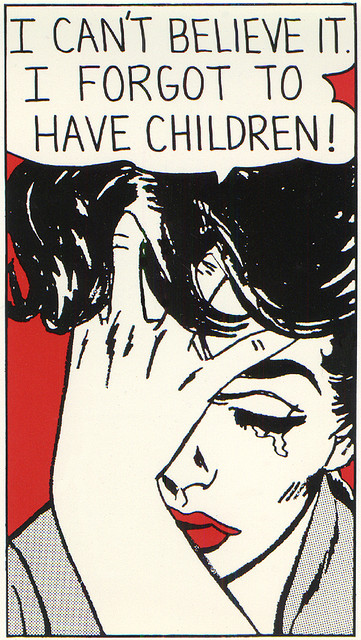by Diane Balser
Non-Motherhood-by-Choice
 As a Jewish woman who has chosen not to have children, how do I make sense of my life in the context of Judaism’s first commandment — God enjoining Eve and Adam, in Genesis 1:28, to “be fruitful and multiply, and fill Earth”?
As a Jewish woman who has chosen not to have children, how do I make sense of my life in the context of Judaism’s first commandment — God enjoining Eve and Adam, in Genesis 1:28, to “be fruitful and multiply, and fill Earth”?
I was raised in a religious home in the 1940s and ‘50s, but I don’t remember either of my parents pressuring me to be a mother when I grew up. Still, isn’t that what Jewish females do? We grow up, get married, and then multiply.
By early adulthood, I had left religious practice behind, believing, as a feminist, that a secular life would give me access to a lot more freedom. One day in the mid-1970s, I bought myself the iconic t-shirt of the era, the Catherine Koetter cartoon of a distraught woman with hot-red lips and the text bubble, “I can’t believe it. I forgot to have children.” I wore the tee as a joke until I realized it wasn’t. I needed a plan. Would I be fruitful and multiply, or not?
I started an inventory of my girlfriends in the women’s liberation movement. Some had chosen single motherhood, some were helping their married friends raise their children, some, mostly lesbians, were choosing motherhood via artificial insemination. Some were going the conventional route, as had most of our parents. There were definitely options. I didn’t want to “forget” to have children, though. I wanted to make an informed, solid decision.
For two years, I systematically interviewed women older than myself. I was surprised to find a lot of them who had chosen not to mother (unlike in my mom’s generation). They were happy with their decisions; they found their lives rich and interesting. This surprised me, as I had assumed (and was often told) that you couldn’t live a gratifying life if you didn’t include motherhood. I agonized for months, and then, not without ambivalence, decided not to have kids. I liked young people a lot — indeed, I teach them as a college professor — but I didn’t want primary parenting to be one of my life’s major commitments.
Four or five years after menopause, I went with a friend to see a film about a woman going to the mikveh for the last time. Through half the film, the woman has ongoing conversations with her adult daughter, but then it becomes clear that the daughter is a figment of her imagination. She’s the daughter the woman wished she had had, but never did. I sobbed, then went home and went to sleep.
The next morning, I discovered that I was menstruating. Imagine my shock. For two days, even though I was then a farbrente secular Jew, I thought that God had miraculously given me one last chance — to both enjoy the potential power that women have to reproduce, and to make sure that I had really, really made the right choice. The third day of bleeding was like my personal Rosh HaShanah. The book was sealed, but I was the one who had sealed it.
Some time after that, I started to participate again in synagogue life. I went back to Jewish texts, wanting to know if my decision was in opposition to Jewish custom and law. The obligation to procreate, I discovered, is upon men, not women. Judaism strongly values women’s health, and in earlier times many women died in childbirth. I also found women in Jewish texts who didn’t have children. Deborah, the fourth judge of pre-monarchic Israel, is probably my favorite. She’s a warrior, a counselor, our own Joan of Arc; she was married, but there’s no mention of children.
In a 15th century commentary, Akedat Yitzhak, I also found a retort to Rachel’s unhappiness about being barren. “Look at Proverbs 31,” the commentator advises, “for intellectual and moral expressions of women’s worth, and for the true purpose of humankind’s existence.”
Of all that I read, though, Rav Kook, the first Chief Rabbi of Israel, spoke to me most deeply. “Procreation,” he wrote, in relation to Genesis 1:28, “is revealed to us as a holy obligation; not some blind biological instinct, but rather an inner Divine goodness to be found in all aspects of life.”
Yes, I thought. In all aspects of life. In my own, I have sought to nurture the human race. I have fought hard on behalf of peace for our people and on behalf of freedom for all women. I believe that I am doing, and have always done, holy work.
And I am following Judaism’s first commandment.
Diane Balser teaches Women’s Studies at Boston University. Active in the women’s movement since the 1960s, she’s a proponent of women’s rights among Jews and an activist in the Jewish peace movement for a two-state solution to the Israeli-Palestinian conflict.
Correction: An earlier version of this piece attributed a cartoon by Catherine Koetter to Roy Lichtenstein. As a feminist magazine, we especially regret this error!
 Please wait...
Please wait...